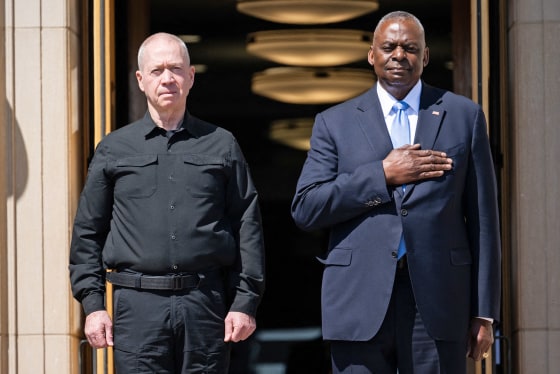Israeli leaders still have not briefed the United States on specific details of their military response to last week’s ballistic missile attack by Iran, even after American military officials have discussed possibly supporting Israeli retaliation with intelligence or airstrikes of their own, according to two U.S. officials.
Defense Secretary Lloyd Austin spoke with Israeli Defense Minister Yoav Gallant on Sunday evening, and one former and two current officials familiar with the call said the two discussed potential responses but not Israel’s final decision on what it could do and when. Israeli officials had met Sunday morning to discuss response options, according to two U.S. officials.
U.S. officials said they do not believe Israel has made a final decision on the specifics of its response but said it has been narrowing and finalizing its options with additional meetings yesterday and today. The options that remain under consideration are targeting Iranian military and intelligence infrastructure, air defenses and energy facilities, the officials said. Gallant and Austin did not discuss nuclear facilities as possible targets, the officials said.
Gallant was scheduled to meet with Austin in Washington on Wednesday — a trip Gallant initiated — but the trip has now been postponed at the request of Prime Minister Benjamin Netanyahu. Three U.S. officials had said they were concerned that the Israeli response could come while Gallant was meeting with Austin.
After Iran launched approximately 200 ballistic missiles at Israel last week, U.S. military officials discussed options for joining Israel in its retaliation against Iran, according to two U.S. officials familiar with the discussions.
The U.S. has long supported Israel with intelligence and that support could continue during Israel’s retaliatory strikes against Iran, the two officials said. Senior U.S. military officials have also discussed conducting very limited strikes against Iranian targets, the two officials said. Strikes inside Iran have been discussed, as have strikes on targets outside Iran, though strikes of any kind are less likely than intelligence sharing, the officials said.
The U.S. could target Iranian assets at sea, the officials said, or try to disrupt Iran’s military assistance to proxies in the region by hitting Islamic Revolutionary Guards Corps sites that support militia groups in Yemen or Syria. A U.S. strike on an Iranian target could be considered defensive if it eliminates a possible threat to the U.S. or allies, like previous American strikes on Iran-linked targets inside Yemen, Iraq, and Syria.
Administration officials emphasized that while the U.S. intends to support Israel’s right to defend itself, no decision on any U.S. action has been made. Three U.S. officials said they do not expect the U.S. to support the Israeli response directly and instead expect the U.S. to back Israel by issuing strong sanctions against Iran.
The three officials said that Israel’s failure to give the U.S. concrete assurances that it will inform the U.S. of its plans well in advance of acting has made the U.S. less likely to take an active role in Israel’s response.
In a statement, a defense official said, "We continue to consult with the Israelis on their next steps but won’t speculate or get into hypotheticals on a potential response to Iran’s Oct. 1 missile attack.”
Israel did not immediately respond to a request for comment.
Gallant asked to come to the U.S.
As Israel weighs its response, U.S. officials are watching for clues about the timing. Austin was expected to meet Gallant at the Pentagon on Wednesday before his trip was postponed. Gallant is the one who suggested he come to the U.S., according to two U.S. officials familiar with the planning.
Generally, a nation does not conduct a major military action while senior leaders are abroad, but Israel dispelled that notion when it killed Hezbollah leader Hassan Nasrallah in Beirut while Netanyahu was in New York for the United Nations General Assembly. Some U.S. officials believe Israel’s retaliation could come while Gallant is in Washington.
Austin was frustrated and angry that Israel did not inform the U.S. that it intended to target Nasrallah, according to multiple U.S. officials. In recent months, Gallant and Austin have spoken multiple times every week, but Gallant informed Austin of the operation against Nasrallah as it was underway.
At a meeting with reporters Monday morning, Pentagon press secretary Maj. Gen. Pat Ryder did not respond directly when asked whether Israel has assured U.S. officials that it will not surprise them again.
“Secretary Austin and Minister Gallant have very regular touchpoints,” Ryder said. “We’ve been very clear that it’s helpful to have awareness about activities in the region for several reasons … We’ll keep those lines of communication open.”
Senior U.S. leaders usually would not be in Israel when it launches an attack like its expected retaliation against Iran. Commander of U.S. Central Command Gen. Michael “Erik” Kurilla was in Israel over the weekend but has now left the country and is not expected to return immediately, according to U.S. officials familiar with his dynamic travel schedule. And U.S. officials say Israel has made it clear that it is not ruling out a response during the Yom Kippur holiday this week.
Since Oct. 7, the U.S. and Iran have communicated to one another that neither side wants this conflict to escalate, according to the one former and two current U.S. officials. U.S. officials believe that short of a major attack on Iranian nuclear infrastructure that shuts down or sets its program back significantly, Iran is not looking for a direct war with Israel and the U.S.




